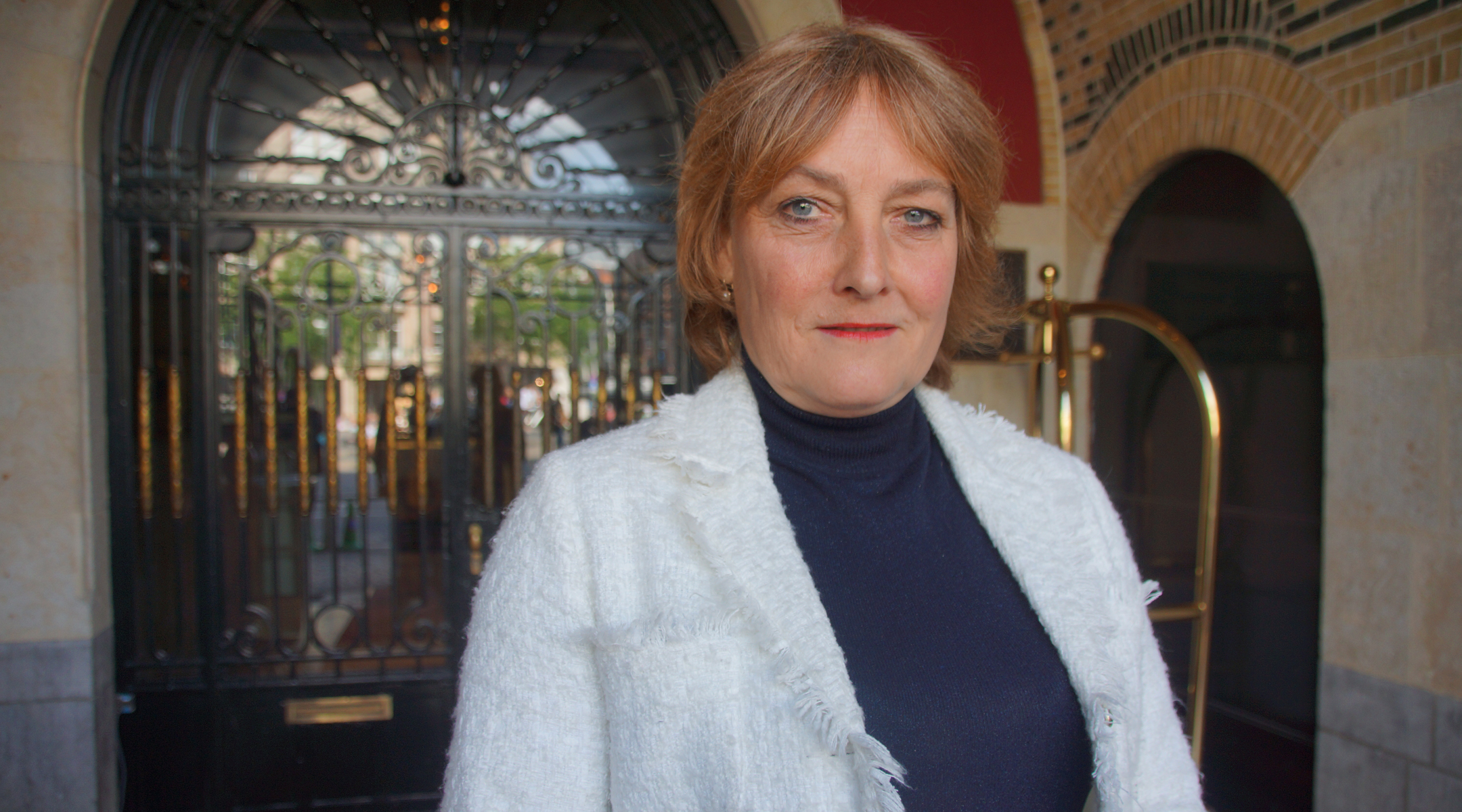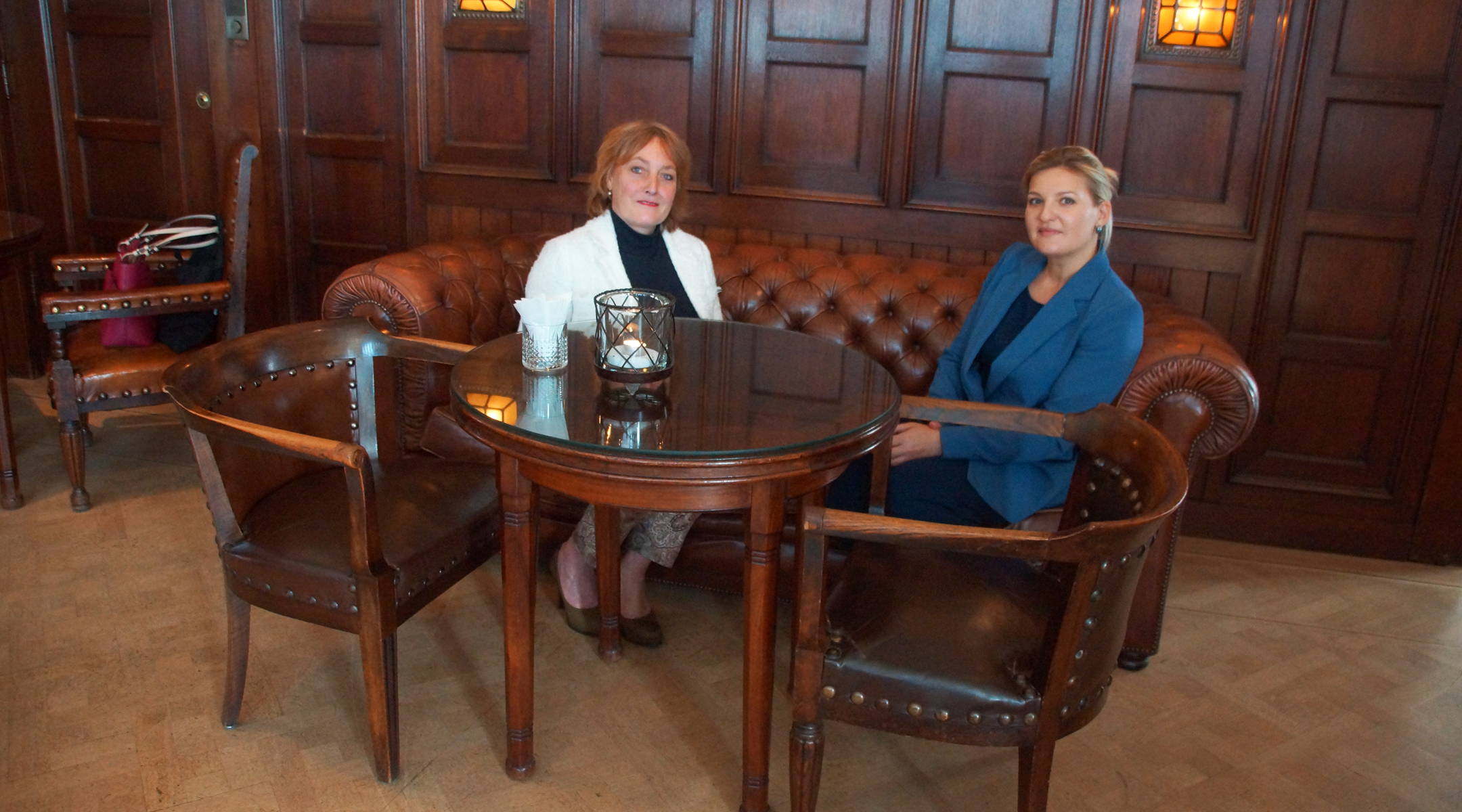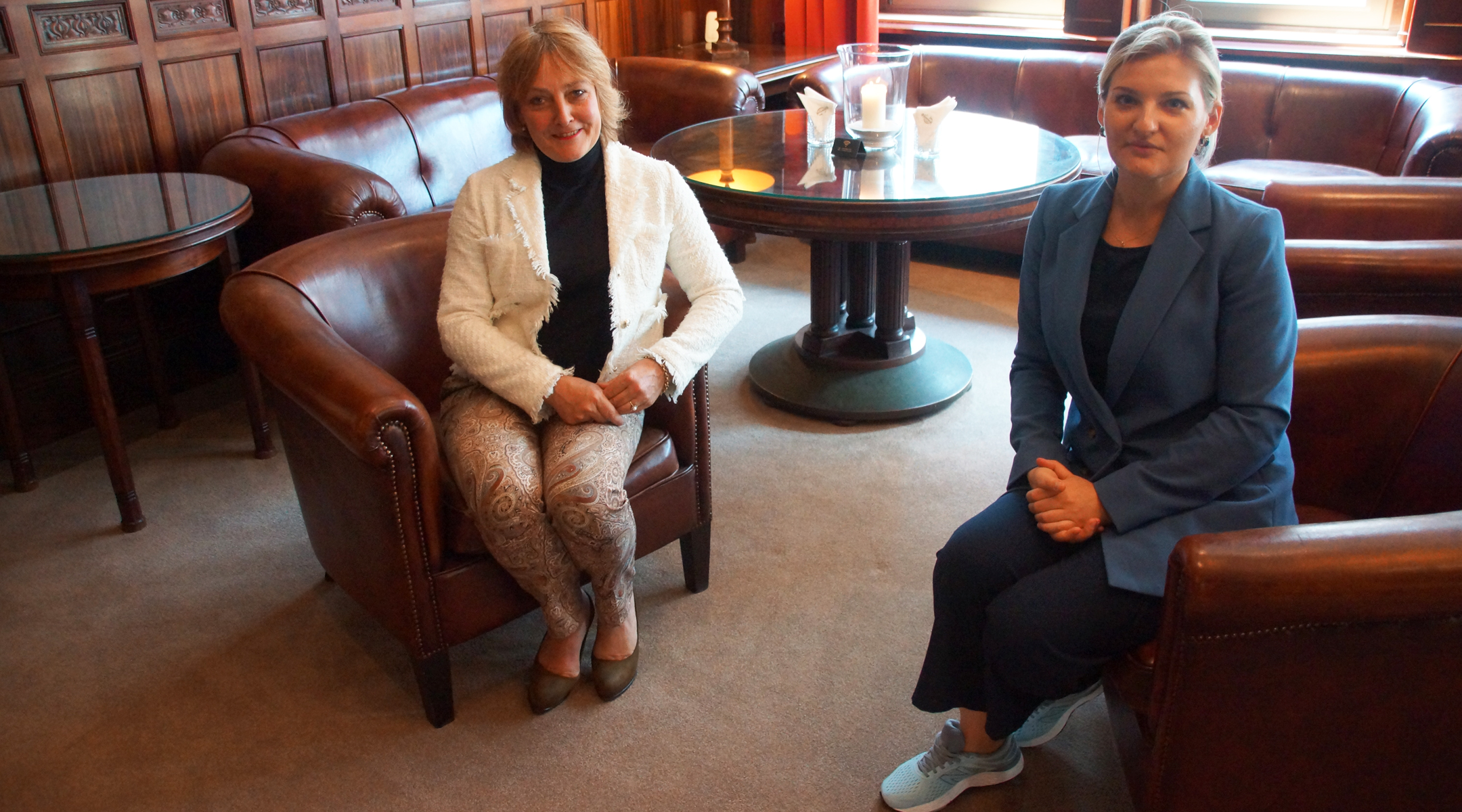In September 2021, the European Union extended for another six months a package of personal sanctions against Russia for actions aimed to undermine Ukraine's territorial integrity, sovereignty, and independence. In addition to personal sanctions, in June 2021, the EU extended until June 2023 sanctions, applied to many areas, for the illegal annexation of Crimea and Sevastopol by the Russian Federation.
After Russia's seizure of Crimea, Dutch lawyer Helen Over de Linden set about studying EU sanctions targeting Russia. She has penned several scientific and research works on the issue. She has also been monitors violators of the said sanctions. Thus, in 2017, a major scandal broke out over Dutch companies that joined the construction of the Kerch Strait Bridge, despite sanctions and the MH17 tragedy, where 190 Dutch nationals died.
In an exclusive interview with Ukrinoform, Heleen over de Linden shared her views on the sanctions regime against Russia, the reasons behind their violation by Dutch companies, and the recently established Crimea Platform.
SANCTIONS AGAINST RUSSIA, DUTCH COMPANIES, AND KERCH STRAIT BRIDGE
How do you think the international sanctions, applied to Russia since 2014, work?
I think they’ve been organized very well. If you ask me what needs to be done to enhance them, I wouldn’t be able to say for sure.
However, in practice, it turned out that they don’t affect Russia as much as we’d like here in the EU. I remember when in 2014 these sanctions were launched, Russia said they would be a real issue as these sanctions were creating certain difficulties for banks, obstacles to receiving loans or credits, oil revenues were dropping, foreign trade was becoming more difficult, as well as getting certain equipment. This all hit Russia bad, but then they found other options, and even started to somehow interact with the EU, achieving their goals through other countries and other structures. So they launched wider cooperation with China and India, although they had been more focused on the EU before.
So sanctions were spelled out really well, they were thought through, but their effect on Russia was weaker than expected.
Can you name the main advantages and successes of anti-Russian sanctions? Which were most efficient?
In my opinion, it’s great that no one is allowed to help Russia build infrastructure in Crimea and Sevastopol. It was prohibited to provide material and equipment, and that was an issue for Russia that sought to build the Kerch Strait Bridge.
We had this huge mess here when a few years ago it turned out there were some Dutch firms that were helping Russia in violation of sanctions. Now our prosecutors are still investigating this.
I think that the ban on such cooperation, such help in building infrastructure, was well thought out, although, unfortunately, there are always some ways to circumvent sanctions and there’s always someone trying to infringe them.
Tours to Crimea are under the ban, too, so if you go there your insurance won’t work, you won’t get consular services, your credit card won’t work and neither will your phone. This all proves that sanctions are good.
One more thing – a ban on trade with the occupied territories in eastern Ukraine, including in coal, but I heard they still find some loopholes. Also, the supplies of equipment and certain spare parts for dual use are barred.

You have already mentioned the scandal with the Dutch companies that came under investigation over the Kerch Strait Bridge construction. The Dutch press named two companies that supplied equipment for the Kerch Bridge construction in 2016. These are Vijlard Hydrauliek and Dematec Equipment. Both denied breaching sanctions. At the same time, in one of your interviews, you said that it was not about the two companies, but about seven. In your opinion, why did the Dutch firms go for such cooperation with Russia after the MH17 tragedy? Could these companies not be aware, whom they render services? Didn’t they know whose territory Crimea is or is it just business for them? After all, those who died on board MH17 cannot be returned and it’s business as usual?
It’s a good question. I remember that when sanctions were first applied, many in our country also suggested that people wouldn’t abide by them. And it did turn out that some people are ready to just do business – and nothing else matters as business is always a priority. And, of course, the companies that violated sanctions, explained their act by claiming they weren’t aware, that everything was in line with the law. After all, they claimed, the Kerch Strait Bridge is in Russia, while sanctions apply to the occupied Crimea – not Russia. So, according to the EU sanctions, they are not supposed to deal with Crimea, while Russia is okay. However, in those sanctions, it is clearly spelled out that, if even indirectly, in any way, they get involved, if anything will be used in or supplied to Crimea, this is also not okay. Besides, even offering consultancy or architectural services is prohibited, too. In my opinion, those people did realize what they were doing. And then they just said “we weren’t aware” to avoid accountability.
What about these Dutch companies? How did the sanctions work?
The courts are yet to hand down their rulings. After 2018, the issue somewhat went to the background in the media and those firms got less coverage. One of the owners has shut his business down. Reports said he’s gone bankrupt. The other company still has a website running, as if nothing happened. I was surprised.
But is the inquiry into these firms still underway?
I contacted the prosecutor’s office several times. They told me that the inquiry was ongoing. They also assured me that they will report the news, if any, and even wrote down my phone number. But then, when I reached out to them again, they told me: “Why do you even think we will be giving you this kind of information? After all, it’s confidential and not subject to disclosure.” And this, of course, happens when an investigation is in progress.
MH17 AND RUINED FRIENDSHIP OF THE NETHERLANDS AND RUSSIA
How do you think the relations between the Netherlands and Russia have changed following the MH17 downing?
Previously, we had pretty friendly relations. Everyone would bring up Peter I who used to live here in Zaandam, and these are some rather nice memories. The Netherlands and the Russian Federation were also tied through numerous cultural events. However, after the MH17 tragedy, relations have been on the decline. Dutch Prime Minister Mark Rutte did everything to spread awareness of what’s happened. He never suggested we should wait for a court judgment – he initially stated that it was Russia who is to blame for the tragedy. So all efforts of our prosecutor’s office are now focused on the MH17 case.
I think the relations won’t get better because there’s the Crimea issue and there’s MH17. Russia acts by the same scenario. Everything starts off with claiming that too many of their people live in a certain area and we are set to protect them. Russia is unpredictable. In the EU, we welcome many emigrants. What if Russians come to like it here and then some province will just get annexed by the principle of “well, there’s a lot of Russians here…” Definitely, many countries fear Russia. The Dutch people used to have very warm contacts with Russia. After the fall of the Soviet Union, many were eager to make friends and travel, but then things began to change, especially after MH17. Sanctions are good, but Russia is also really smart and sly. They will always be able to find some loophole.

Did you personally know any of those who died in the MH17 crash?
My father knew someone whose son died. He was my age. Also, a friend of mine knew an owner of a shop he regularly goes to, who died there, too. Everyone knows someone. There’s always someone who has some friend or a friend of a friend. Also, there are people who are complicit in what has happened then. And from the EU’s perspective, it is logical if sanctions are applied to such individuals. It could be a travel ban or an asset freeze if they have any assets here. But most often, these people don’t have such assets so this doesn’t affect them much. I don’t know how exactly Russians treat the fact that they are in a sanctions list. I believe, if this doesn’t really spoil their image in their home country, this isn’t too important for such people. They can just move on with their lives, while Putin hands them all kinds of awards, medals, and such. So they’ll be deemed heroes in Russia and it’s not important that everyone outside Russia is against them.
How do you think the sanctions and the deterioration of relations between the Netherlands and Russia have affected Russians living in the EU, in particular the young ones studying here? Has Putin's inner circle begun to feel the effect of sanctions?
Sanctions don’t say a word about the children of Russian oligarchs. But I think that for the Russians whose kids study here this, of course, is an issue. After all, if you weren’t on a list yesterday, things can change tomorrow. So they could be anxious about it.
TRIALS IN THE HAGUE AND “BANANA REPUBLIC”
Is Russia wary of the judgments of courts in The Hague? In particular, in November 2019, the UN International Court of Justice recognized its jurisdiction in the case of Russia's violation of two conventions – on the fight against the financing of terrorism and the prohibition of all forms of racial discrimination. In addition, Russia must explain why it failed to comply with the interim measures imposed by the Court more than four years ago, including the demand to remove obstacles to the operations of the Crimean Tatars’ Mejlis. Can Russia allow not complying with court judgments?
Another good question. I believe the answer to this question should have two parts. Russia doesn’t admit its guilt, and this was the case with the Greenpeace activists – Russians never recognized the court.
But Russia did comply with the judgment of the arbitral tribunal in the Arctic Sunrise case, even though it happened a few years on (the Permanent Court of Arbitration in The Hague found Russia a violator of the UN Convention on the Law of the Sea and ordered that it pay the Netherlands compensation in the case of seizure of the Arctic Sunrise vessel when Greenpeace tried to hold a protest rally against oil production on the Arctic shelf in September 2013).
This is an example of them not recognizing it at first. Also, Putin amended the Constitution in 2020. According to these amendments, it was proposed to refuse from complying with the judgments of international courts, including the ECHR. And that’s despite the fact that Russia, as a Council of Europe member state, which ratified the European Convention on Human Rights, must comply with the ECHR decisions. So I believe Russia has long had this tradition of choosing whether to follow the court rulings or not.
Also, as for the International Criminal Court in The Hague, it was established based on the Rome Statute. Ratification of the Rome Statute implies that its jurisdiction extends to all countries that ratified it. At the same time, Russia has recalled its signature from the Rome Statute, while this doesn’t prevent other powers from prosecuting Russian nationals for crimes committed in the temporarily occupied areas of Donetsk and Luhansk regions, and in Crimea. After all, the ICC is about individual responsibility of a certain person, for example, someone from among political or military leadership.
However, no matter what, everyone here believes it is necessary to pursue these trials. These are fundamental cases that The Hague will investigate even if Russia doesn’t want to comply with the judgments. It’s a really important fact that the international arena will consider Russia as some “banana republic.”

Can Russia not comply with the decision of the UN International Court of Justice in the "Ukraine v. Russia" case? Compliance with the decision of the UN International Court of Justice is an obligation and responsibility on the part of Russia, enshrined in the Charter of the Court and extending in particular to Russia. In addition, representatives of the Russian Federation and their lawyers attended court hearings. So it turns out that they do recognize the court, right? Is it possible to oblige the Russian Federation to comply with the court ruling?
This all depends on what’s laid down in the Russian constitution and other legislation. And I believe that Putin was aware that many decisions would be not in his favor so Russia will always find some pretest to not recognize and not implement the rulings. As for the MH17 case, Russia and the EU have no mutual extradition agreement. If these four indicted individuals are convicted, Russians won’t hand them over because there’s no such deal.
But they actually can find a way out, in particular, as was the case with that swap. It’s when Russia demanded that former militant Vladimir Tsemakh, who was important to the Netherlands in the MH17 case, be handed to them. Russia forced Ukraine to extradite him as part of a large-scale exchange of held persons. Then 35 Ukrainians returned home. So it turns out that bargaining with Russia is always appropriate, right?
This, of course, is always possible in any case, even if there are no agreements or court judgments in place. That’s when both countries are willing to do a swap and they have something to exchange.
CRIMEA PLATFORM AND RIGHTS VIOLATIONS
International laws are not being observed in Crimea. Please, tell us about the violations in the annexed Crimea.
The ban on Crimean Tatars’ Mejlis on the part of Russia constitutes a direct violation of human rights. This confirms that Russia is oppressing the indigenous people. It is terrible to see that, after the Crimean Tatars finally settled down in Crimea, having managed to return to their homeland, they are facing such an injustice.
Besides, starting March 2014, Ukrainian entrepreneurs have been forced to leave their homes due to the annexation of Crimea by Russians. Also, key sectors of the economy were effectively seized, including profitable enterprises, resorts, and so on, which is also a human rights violation. In fact, Article 1 of Protocol 1 to the Convention on Human Rights and Fundamental Freedoms says that every person “is entitled to the peaceful enjoyment of his possessions.” For example, Russians got their hands on the Masandra winery, which was nationalized and then sold at dumped prices. And this is a violation of property rights. I believe there are many such examples as all key sites there, all those resorts, have been seized by Russia by the same scheme.
Why is Crimea so important for Russia? In your opinion, when can it return home?
To get Crimea back, there could perhaps be some kind of barter or offering Russia something that’s of interest to them but at the moment I have no idea what that could be. But such a swap is always possible. It will be really difficult to change things. It’s not easy for them to just give up on this territory as it’s important to them to have their Black Sea fleet there in Sevastopol. Besides, there’re all those resorts. I believe it’s within the Crimea Platform that discussions should be launched on how to return Crimea, what to offer in return, and what to swap it for.
What do you think about this Crimea Platform initiative, which launched its work in Kyiv on August 23? Tell us about your impressions. What are the chances that it will help find new solutions?
I think it’s a very good initiative. I’ve been researching sanctions since 2015 and initially there’s been plenty of interest in the Crimea issue. People would ask for interviews, ask questions, and invite me to read lectures. Then, starting from 2019, there’s been less and less interest to Crimea in the Dutch media. So I thought it was a bad trend and time seems to make people forget, so some countries could start changing their minds and reconsider their stance on Crimea recognition, therefore it would be unfair not to talk about it. It’s really great that there is such a platform and that it engaged such significant participants.
Previously, Russia really sought to be EU’s friend, and this kind of influenced Russia as they didn’t want to be parasites, didn’t want to be left with no respect. But now, I believe, they’ve grown used to it and think of themselves as a powerful player as they are building up ties with China, India, and some other countries. At the same time, it’s very important that the Crimea Platform always put focus on the situation that’s developed. The international community must remember that Russia occupied Crimea, and in this context, the Crimea Platform is a really good initiative.
Iryna Drabok, The Hague
Photos by author
im
